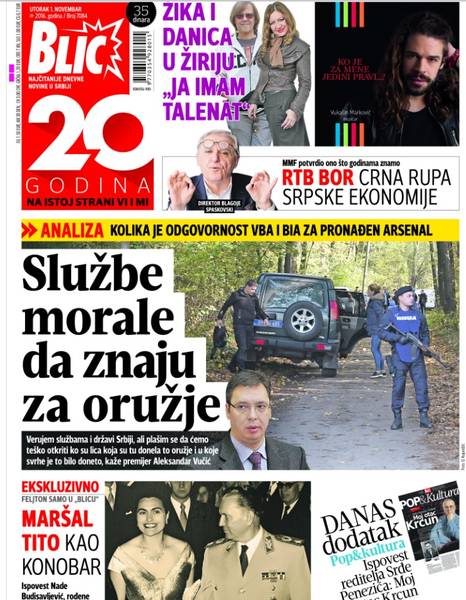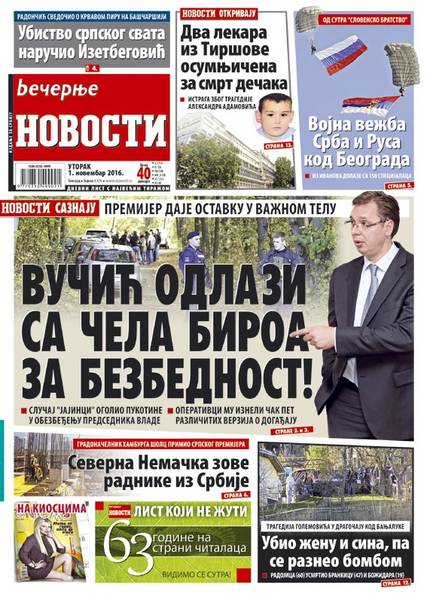The Big (non)Event in Croatia - Kolinda Spoke, but Said Nothing
Adelina Marini, November 1, 2016

Greetings from festive Zagreb, where today is a holiday because of All Saints Day! Regardless of the day being a holiday, there is a lot to be found in Croatian media. In today’s edition we are also following who is in opposition to the new/old majority in the Croatian Parliament and we continue the subject of Pernarism. We also keep an eye on the development of the latest Serbian drama – the “Jajinci” case and the “Montenegro” spy affair, as well as the ongoing dilemma of whether the Belgrade-Priština dialogue will survive.
A long awaited and badly spent interview
Croatian journalists and Twitter activists have been asking for months when will they finally hear from the Croatian president. They marked the weeks and then the months since her last press conference. All this amidst a process of turbulent political transformation in Croatia. The silence of President Kolinda Grabar-Kitarović was deafening. And behold, she finally spoke. Last night Croatian television channel RTL aired an interview with her by the very experienced and famous for her sharp questions journalist Mirjana Hrga. The interview, however, was disappointing, for it left the impression of being too accommodating. It looked more like an interview for a women’s magazine, than serious journalism, which is to be expected from a serious journalist in prime time.
Watching the interview one cannot help but ask oneself who wrote the questions – whether it was the experienced journalist, or the PR team at Pantovčak (the address of the president’s office). Questions varied from support for abortions, women’s rights, and what is it like being the head of state and mother of two, to the tax reform, proposed by government, but also how many countries has Mrs Grabar-Kitarović visited. 20 minutes, in which the president was not held accountable for the fulfilment of commitments she made during the presidential elections, no account was asked for on the past year and ten months in office, on her sometimes controversial decisions, and also about her silence. In all of the diversity of questions, asked of a celebrity it seemed like, not a civil servant, some Croatian media singled out a gaffe.
To a question about the presidential elections in the USA Kolinda Grabar-Kitarović made a slip in saying that “The Americans will decide who our next president will be, I mean their next president”. The slip was picked up by media of the region as well. Serbian national television RTS reported that the Croatian president made a gaffe during her interview for RTL. Bosnian website 6YKA also reports that the Croatian president said that Americans will decide who will be president of Croatia. Actually, the gaffe was the interview itself, and a heavy journalistic gaffe at that, which shows that Croatia still has a long way to go before it shakes off journalistic subservience to those in power. Actually, the interview with Mrs Grabar-Kitarović was also indicative as timing, for the previous government, headed by Tihomir Orešković, became famous first of all with its attempt at putting harness on the state media. Prime Minister Andrej Plenković promised during the campaign for the snap elections of September 11 that he will work for media independence. Obviously it is the president’s turn as well.
How did Pernarism appear?
Croatian media keep looking for an answer to the question how did Pernarism appear, named after the most vocal MP from the anti-Europe and anti-NATO party Live Wall Ivan Pernar. Political scientist Boško Picula writes in his column for tportal that the reason why Ivan Pernar is so outspoken is that he is practically the sole strong opposition to the new majority. The former PM and still leader of the Social Democratic Party (SDP) Zoran Milanović made a mistake by not throwing his resignation immediately, but turned into a leader who has been withdrawing for months, while the campaign for electing a new leader is ongoing. Currently, PM Andrej Plenković has no strong opponent in the Sabor. The only one is Ivan Pernar, writes Boško Picula.
The Vecernji list correspondent to Brussels Tomislav Krasnec, on the other hand, reports that now more than ever the debates for the EU will turn into an integral part of the domestic political debate in Croatia. After the new government gave a clear sign that it intends to report and debate on a regular basis in Parliament on the results of every meeting of the European Council, it would mean that the radical and anti-EU positions of Live Wall will become more and more heard. “All this has the potential to start a discussion, which would answer the question that many citizens have had not answered, or answered with not sufficient arguments, or at all: exactly what is the benefit to Croatia from its membership in the Euro-Atlantic structures?”, writes Tomislav Krasnec.
Traces of unknown DNA and ... GRU
It is not a non-working day in Serbia, but it is another non-working day in a row in the sense that everyone is busy with something that is of no benefit to anyone – scandals, affairs, theories. There is hardly any new information around the bizarre “Jajinci” case – the weapons cache discovered in close proximity to the family home of Prime Minister Aleksandar Vučić in the Belgrade neighbourhood of Jajinci, although the PM is already backing down on this. Danas reports that, according to the PM, it is unlikely that it will become known who left the weapons. “I trust the agencies and the state of Serbia, but I am afraid that it will be difficult to find out who the people who brought these weapons are and what was their goal”, said Vučić to journalists during his one-day visit to Hamburg on Monday. He believes the case to be too complicated to be resolved easily.
After that he once more got into the role of a drama queen by stating that he will talk on this subject no more. “We are spending too much time on ourselves, instead of on our country and our citizens and I have no right to allow myself this”, said he in his typical style. His Minister of Internal Affairs Nebojša Stefanović reported in the meantime that traces of DNA from three people was found, but they are so mixed up that they will be difficult to identify. In a commentary for the same newspaper, titled “Terror attack on trust”, Ivan Radak writes that it would be a mistake to view the story of the claims that a terror attack is being prepared in isolation from the increase of salaries and pensions and the resolution of the problem with several mega companies, who are heavily in debt.
According to the author, Vučić has once more demonstrated his inability to deal with the debts of those giants. “Should one sum the debts of not just these enterprises, but other sectors as well, like healthcare for example, it will become evident very fast (and the IMF and the EU have already warned about this) that our financial stability is fragile”, writes Ivan Radak. The author reminds that the problem of enterprises in debt has not been solved during the four years in power of the PM. “If we find ourselves, after such a period, still looking for personnel who are capable to do something, what are we discussing anyway? Four years were sufficient enough to clear out the largest of garbage piles. However, in all this mess, it seems like we are losing track of time”, ends his commentary for Danas Ivan Radak.
 Vecernje novosti reports on its first page that the PM will resign from his post as boss of the Security Bureau because of the “Jajinci” case. The newspaper has learned from its sources that over the next few days the prime minister will notify the president of his decision. This is the first specific political consequence from the “Jajinci” case, which revealed the cracks in the security system for the first man in the government, writes the newspaper. Agencies are for four days unable to put their finger on who left the weapons cache in close proximity of the house of Vučić. According to Vecernje’s sources, the PM is not happy with the fact that agencies have failed to assure him that they have control, giving him full five different versions so far.
Vecernje novosti reports on its first page that the PM will resign from his post as boss of the Security Bureau because of the “Jajinci” case. The newspaper has learned from its sources that over the next few days the prime minister will notify the president of his decision. This is the first specific political consequence from the “Jajinci” case, which revealed the cracks in the security system for the first man in the government, writes the newspaper. Agencies are for four days unable to put their finger on who left the weapons cache in close proximity of the house of Vučić. According to Vecernje’s sources, the PM is not happy with the fact that agencies have failed to assure him that they have control, giving him full five different versions so far.
Montenegro Pobjeda reports, quoting the Montenegro website Pink, which has the same symbols as the Serbian tabloid TV channel of the same name, that the GRU (Russia’s military intelligence agency) stands behind the attempts to organise terrorist attacks in Podgorica for the October 16 parliamentary elections. According to Pink, intelligence officers from the famous Russian army intelligence agency have left Belgrade last week. They had planned attacks, which were to be executed at the closing of the election day in Montenegro on October 16, right after the results are announced.
Three scenarios for continuing the negotiations between Belgrade and Priština
Blic today offers several scenarios for the negotiations between Belgrade and Priština, which for the last few days have been among the leading subjects in the Serbian political discourse. The newspaper reports that negotiations are ever more prolonged, because there are questions at the table which are ever more national-political. After Belgrade pulled back the Law for Trepča (a mine in Kosovo, which Serbia has claims for), on which the parliament in Priština provided for all the assets of this complex be Kosovo property, new requirements appeared from the Kosovo side, among which is the payment of war compensations and guarantees that Serbia’s membership to the EU will only happen after the recognition of the state of Kosovo. In such an environment, writes Blic, it is difficult to forecast the direction in which the relations between Serbia and Kosovo will take.
According to analyst Bojan Klačar from the Centre for Free Elections and Democracy CESID, a radical scenario is out of the question. He believes that negotiations will continue because the EU insists on it, and at the moment the status quo is not beneficial for anyone. On the other hand, however, he says for the newspaper it is difficult to forecast the path that negotiations will take. He sees two levels. At the first one, essential questions are to be resolved, and on the lower one answers will be given to vital and local questions. The highest ranking civil servants need to participate on the second level, believes the analyst. The Kosovo political scientist Albinot Maloku believes that prime ministers need to negotiate on the political issues and the economic or sports ones are to be discussed by the corresponding ministers. Both states are using the dialogue for political advertisement and practically very little is really accomplished, says the Kosovo analyst.
Translated by Stanimir Stoev
 Bakir Izetbegovic, Andrej Plenkovic | © Council of the EU
Bakir Izetbegovic, Andrej Plenkovic | © Council of the EU Aleksandar Vucic, Recep Tayyip Erdogan | © Serbian Presidency
Aleksandar Vucic, Recep Tayyip Erdogan | © Serbian Presidency Jean-Claude Juncker, Zoran Zaev | © European Commission
Jean-Claude Juncker, Zoran Zaev | © European Commission